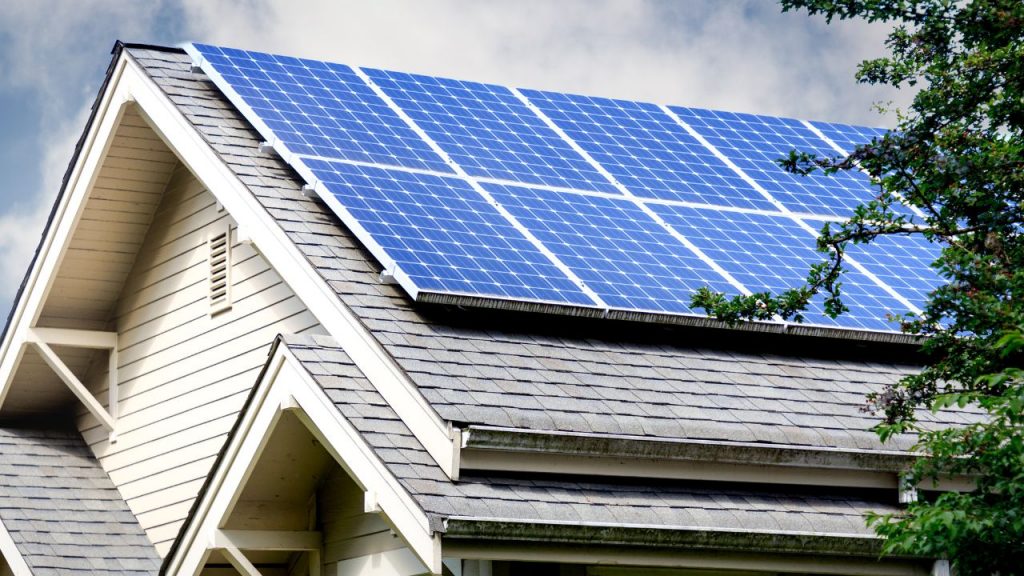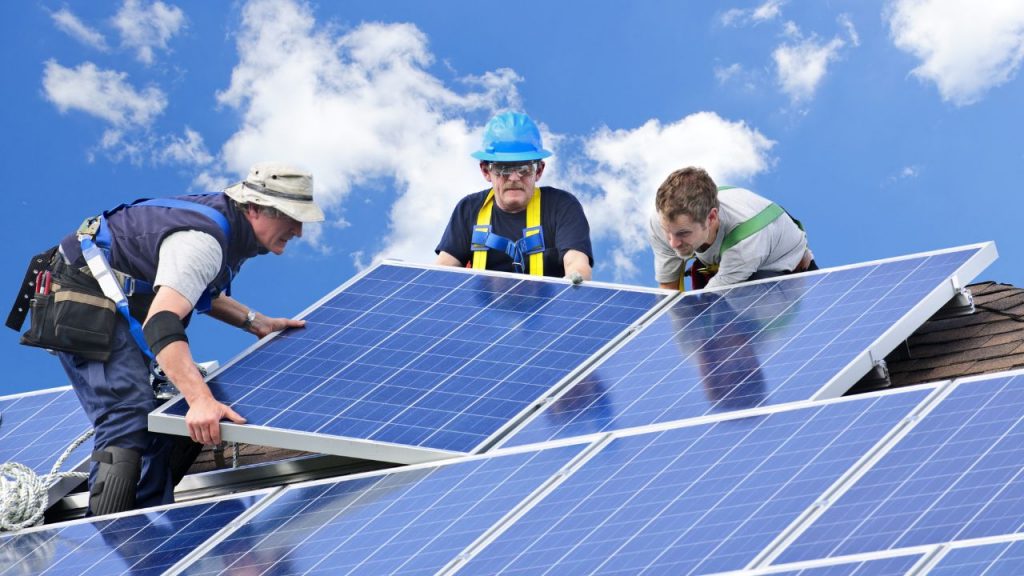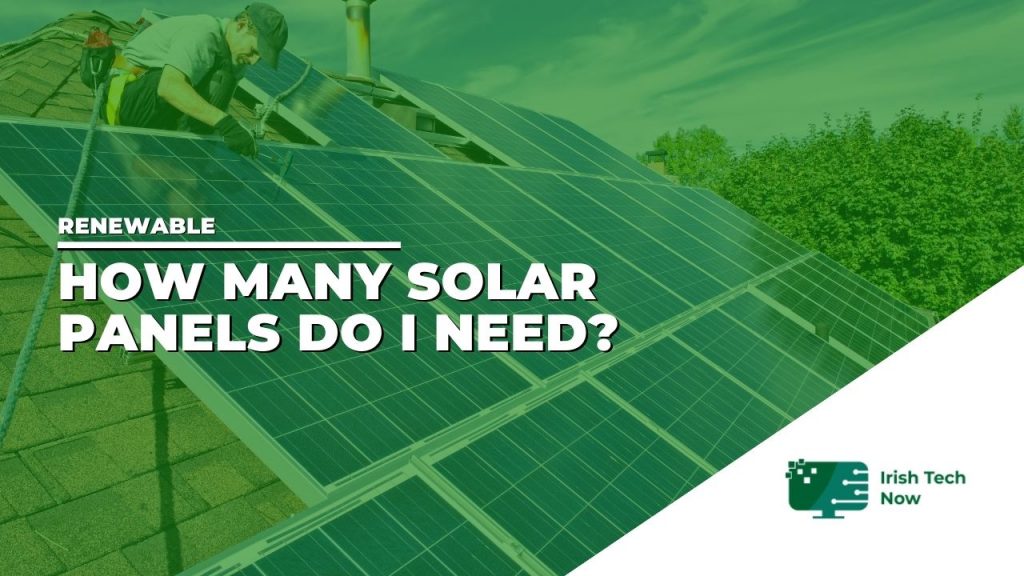Solar energy has gained significant popularity recently as an environmentally friendly and cost-effective alternative to traditional electricity sources. If you’re considering installing solar panels in Ireland, you might wonder how many solar panels you need to meet your energy requirements. In this article, we will provide a comprehensive guide to help you determine the optimal number of solar panels for your Irish home.
What Are Solar Panels?
Solar panels convert sunlight into electricity, also known as photovoltaic (PV). They consist of multiple solar cells made from semiconductor materials, such as silicon, which generate an electric current when exposed to sunlight.
How Do Solar Panels Work?
Solar panels work through the photovoltaic effect. When sunlight hits the solar cells, the photons from the sunlight knock electrons loose from their atoms. This creates an electric current that can be harnessed and used to power electrical devices or stored for future use. There are various solar panel components which work together to generate electricity.
Factors Influencing Solar Panel Calculation

Several factors must be considered to determine the number of solar panels needed for your Irish home. These factors include:
Energy Consumption
Your energy consumption is vital in determining the size of the solar panel system you require. By analyzing your electricity bills, you can estimate your average daily energy consumption, measured in kilowatt-hours (kWh).
Roof Orientation and Tilt
The orientation and tilt of your roof are crucial for maximizing solar panel efficiency. South-facing roofs with a tilt angle between 30 and 40 degrees in Ireland yield the best results. However, solar panels can still be installed on east or west-facing roofs with slightly reduced efficiency.
Available Roof Space
The available roof space will determine the total number of solar panels that can be installed. Considering shading from nearby trees or buildings that could obstruct sunlight and reduce panel performance is important.
Solar Panel Efficiency
Solar panel efficiency refers to how effectively the panels convert sunlight into electricity. Higher-efficiency panels generate more electricity for a given surface area, allowing you to produce more power with fewer panels.
Sunlight Availability in Ireland
While Ireland’s weather is often associated with cloudy skies, solar panels can still generate electricity even in overcast conditions. It’s important to consider the average sunlight hours in your area to estimate the solar panel system’s output accurately.
Estimating Energy Consumption
Assessing Your Current Electricity Usage
Review your electricity bills from the past year to estimate your energy consumption accurately. Note the average daily kilowatt-hours (kWh) usage and identify seasonal variations.
Understanding Annual Energy Consumption
Multiply your average daily energy consumption by 365 to obtain your annual energy consumption. This value will be essential for calculating the number of solar panels required to meet your electricity needs.
Determining Solar Panel Requirements
Solar Panel Wattage and Power Output
Solar panels have different wattages and power outputs, determining their electricity generation capacity. The higher the wattage, the more electricity a panel can produce. Consider panels with wattages suitable for your specific energy requirements.
Calculating the Number of Solar Panels
To determine the number of solar panels needed, divide your annual energy consumption by the average output of a single solar panel. This calculation will estimate the minimum number of panels required to meet your electricity needs.
Considering Energy Storage
If you wish to store excess energy from your solar panels, consider investing in a battery storage system. Energy storage allows you to use surplus electricity during low solar production or when the grid experiences outages.
Professional Assessment and Consultation
Seeking Expert Advice
To ensure an accurate assessment of your solar panel requirements, consult a professional solar panel installer. They will consider all the necessary factors and provide tailored recommendations based on your circumstances.
On-Site Evaluations
Solar panel installers may conduct on-site evaluations to assess your roof’s suitability, shading issues, and orientation. These evaluations help determine the most efficient system design and the optimal placement of solar panels.
Government Incentives and Grants
SEAI Grants
The Sustainable Energy Authority of Ireland (SEAI) offers grants and financial incentives to promote the installation of solar panels and other renewable energy systems. Check the SEAI website for the latest grants and eligibility criteria information.
Tax Credits
In addition to grants, homeowners in Ireland may be eligible for tax credits related to solar panel installation. Consult with a tax professional or visit the Revenue website for details on the current tax credit schemes.
Choosing the Right Solar Panel System
Mono vs. Poly-Crystalline Panels
When selecting solar panels, you’ll come across mono-crystalline and poly-crystalline options. Mono-crystalline panels tend to have higher efficiency and sleeker aesthetics but can be more expensive. Poly-crystalline panels offer a cost-effective alternative with slightly lower efficiency.
Types of Mounting Systems
Various mounting systems are available for solar panels, including roof-mounted and ground-mounted options. Consider the available space, roof condition, and aesthetic preferences when choosing the mounting system that suits your needs.
Warranty and Performance Guarantees
Review the warranty and performance guarantees offered by solar panel manufacturers. A longer warranty period and robust performance guarantees indicate the manufacturer’s confidence in the panel’s quality and durability.
Hiring a Qualified Solar Panel Installer
Researching Local Installers
Do thorough research and gather recommendations for reputable solar panel installers in your area. Check their certifications, experience, and customer reviews to ensure you choose a reliable and qualified installer.
Reading Reviews and References
Reading reviews and contacting previous customers can provide insights into the installer’s professionalism, quality, and customer satisfaction. Consider requesting the installer’s references to understand their track record better.
Requesting Quotes
Contact multiple solar panel installers to request quotes for the installation. Compare the quotes, considering the proposed system design, equipment quality, and overall cost. Choose an installer that offers a balance of competitive pricing and high-quality work.
Installation Process and Considerations
Permits and Planning Permissions
Before installing solar panels, check with your local authorities or planning department regarding permits or planning permission requirements. Compliance with local regulations ensures a smooth installation process.
System Installation and Integration

Once you’ve selected an installer, they will proceed with the installation process. This involves mounting the panels, connecting them to the electrical system, and integrating additional components such as inverters and monitoring systems.
Monitoring and Maintenance
Regular monitoring and maintenance are crucial for your solar panel system’s optimal performance and longevity. Consult your installer regarding recommended maintenance practices, including cleaning, inspections, and addressing any potential issues.
FAQs
Can solar panels generate electricity on cloudy days in Ireland?
Yes, solar panels can still generate electricity on cloudy days, although their output may be reduced compared to sunny days.
How long do solar panels last?
Solar panels are designed to last for several decades. Most manufacturers offer 20 to 25 years of warranties, ensuring their performance and durability.
Are there any specific regulations for installing solar panels in Ireland?
While no specific regulations exist for residential solar panel installations, it’s essential to comply with local planning permission requirements and adhere to relevant safety standards.
What is the average payback period for a solar panel system in Ireland?
The average payback period for a solar panel system in Ireland typically ranges from 7 to 12 years, depending on factors such as energy consumption, installation cost, and available grants or incentives.
Are there any alternatives to solar panels for renewable energy?
There are other renewable energy alternatives, such as wind turbines, hydroelectric power, and geothermal systems. The suitability of these alternatives depends on the specific location and available resources.

With a Bachelor of Arts (Hons) in Creative Digital Media from MTU and a career as a Digital Marketing Executive, Ciaran is at the heart of the tech scene. Passionate about technology and an avid blogger, Ciaran has a talent for making tech topics both engaging and understandable. Follow Ciaran for straightforward insights into the digital world.

